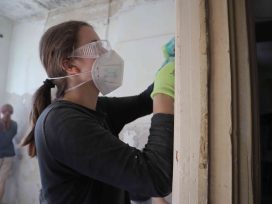When you become an immigrant, you have lost or are in the process of losing much: your country, your language, your culture, your friends. But you also gain much: a new country, new knowledge, new experience, and perhaps new friends. The tension between the loss and the gain – or the debit and the credit side of your life’s account – makes you feel as if you were living two lives, one you’ve left behind, and one you are living at the moment. You have not completely abandoned the old life, and you have not fully absorbed the new life.
When my family and I arrived in America, we changed not only continents but entire worlds, and that is always a difficult thing. It was difficult for me despite the fact that my professional life was deeply connected with our country of immigration: I was an English teacher at the University of Sarajevo, and my academic field was American Studies, the study of the United States. In my classes in Sarajevo, I tried to explain something of American culture and history to myself and to my students – a hard task in both instances – but I liked the constant challenge of comparing American culture with my own. My approach was to incorporate material from history, literature, art, language, landscape studies, anthropology, and anything else that could capture and convey some telling essence of American life.
America has always struck me as so different from my part of the world that for a long time I thought of it as strange and exotic – from artefacts to sports to behaviour patterns, from small things to big. This strangeness of America was, I’m sure, what attracted me to American Studies. I once compiled a catalogue of the visibly different things a southeastern European sees in the United States: windows that go up and down, like a guillotine, and do not open inside; doorknobs instead of handles; screens on doors and windows; water in toilet bowls; coiled rather than solid burners on the electric range; different measures and sizes; a different voltage; more static electricity; drinking fountains; relative absence of tobacco smoke; sports such as football and baseball; empty streets; lawns in front of homes (and lawn mowers, which provide a typical, inescapable American sound, as opposed to, for example, the equally inescapable European exact-time beep on the radio); heavily patterned wallpaper in contrast to lightly designed or blank wallpaper; wall calendars wrapped in cellophane and looking like old-fashioned LP albums; acronymic names of radio stations; shorter but wider printer paper.
Becoming an immigrant when you are an adult (say, middle-aged or older) is particularly hard because your previous life “interferes” with your immigrant life in more ways than you expected. So my two lives, the one in Bosnia (or former Yugoslavia), and the other here, in America, are constantly colliding, and I’m always comparing, contrasting my two lands, always “translating” from one into the other. This is of course true of my language situation, my linguistic identity, where translation of a kind always takes place between my native language and English. I “translate” between my two lives in other, perhaps less significant ways. Just to give you some examples, I still have to stop to think whether a date like, say, 08.06.06 is 6 August or 8 June (as it would be in Europe), or whether Memorial Day or Labour Day falls in May (since in much of the rest of the world Labour Day is 1 May), or how tall one is when measured in feet and inches, or what 98°F, often enriched with humidity, is in centigrade, and whether it matches anything from my former experience (it doesn’t).
As soon as you become an immigrant, everything irrevocably changes for you: space, landscape, the weather, the human geography – and even time. This last – time – turns against you: in the new country and in your new life, you are always behind; you want to catch up with things and events, to come up to the time level of everybody else because so much had happened when you weren’t here. You badly need all kinds of practical information, for example, so that you constantly ask questions, and that tends to make you feel outdated, lagging behind, and awkward. American society is more opaque in this fundamental informational sense: as a newcomer, you do not learn about people (individual people, their private lives, and power relationships among them) as easily as elsewhere. In America, in this sense, you feel that people generally do not know much about others, that the right hand does not know what the left hand is doing, as it were. But, strangely, this condition of ignorance in which you find yourself also makes you feel younger, like a young person asking basic questions, and gives you a sense of a new beginning, of learning, and exploring, of being initiated. And starting from scratch keeps you on your toes.
By contrast, when you revisit the old country, in spite of the changes you see, your personal time seems to have stopped at the point of departure, since you remember a life there that is now permanently fixed in your memory. There, you are your old self (or you imagine you are) because you haven’t lived through the changes that occurred. And that is how your old-country friends, acquaintances, and relatives see you – as your old self; what you do and how you live in the new country is of no real interest to them – there is hardly any curiosity about the new you. For all practical purposes, you have disappeared for them. You’ve truly “gone west”, as the old phrase has it: “gone west” was an American metaphor for dying. And you wonder if the people there have always been so self-referential or if they have become such only for you.
The immigrant is, psychologically, pulled back towards home by the power of memory, which is a major interference and something that insistently inhabits her or his new world. (Interference is also a linguistic term describing the obstacles presented by our native language when we try to learn a foreign language – it’s always in the way, pulling us back, making it harder for us to master the strange new sounds and word order, for example.) This memory of the old things often starts with me as a visual representation, as images; so, for example, when I see Lake Michigan, which is close to where I now live, my subconscious thought is directed toward the Adriatic Sea, the large and familiar body of water in my former life and country; or when I see dark-blue clouds piling up on the horizon here, in the flat Midwest, they often appear to me, momentarily, as distant mountains, like those surrounding my hometown. High-rise apartment buildings here, with their tiny identical balconies suggesting congested living, buildings that I never appreciated as architecture, bring to mind the old country, the sense of sharing and of human closeness. And – perhaps most strangely – when I catch a whiff of cigarette smoke, a much rarer thing than in the old country, and I can’t stand smoking, that immediately transports me to an earlier geography and to my earlier life.
All this is, of course, nostalgia, that constant companion of an immigrant’s life. Although a universal human sentiment, nostalgia is hard to define precisely, and this is confirmed by interesting linguistic information: this concept is handled differently in different languages. The word “nostalgia”, as Milan Kundera reminds us, comes from the Greek words nostos (return) and algos (suffering) – so, suffering because of the inability to return. But its different forms and nuances of meaning range widely in a number of European languages (and not all of them use the Greek-derived word primarily), describing a longing for home, a pain of absence, loneliness, or ignorance of what happens in the home country (Spanish añoranza, añorar – from Lat. ignorare).
Because of the distance travelled and the change experienced, home to the immigrant appears better and sweeter that it actually was, gaining a new, greater value. This feeling can occur when you actually return to the old country: when I am in my hometown of Sarajevo for short visits, the scent in the air on a summer night is uniquely intoxicating, like nothing I experience here in America, and those pine-wooded hills look more beautiful, now that I live elsewhere, than ever before. But nostalgia is mostly about missing people, those with whom I worked, lived and shared a frame of reference. I miss the urban and urbane life of Sarajevo, its distinct sense of humour, its irony, both gentle and harsh, and its openness to the world. (But most of that was destroyed by the recent war anyway, so my nostalgia in this case is not merely geographic but “historical” – a longing for the past, which is another form of nostalgia. Bosnia, for me, is becoming a country of memory, to borrow Denis de Rougemont’s description of Europe –“la patrie de la mémoire.”)
Nostalgia, though a real feeling, is also a pleasant lie. “How handsome must our country be when seen and felt from outside!” writes the Spanish author Miguel de Unamuno. Another writer, the Nobel-Prize-winning V.S. Naipaul, offers in his novel A Bend in the River, a practical cure for nostalgia – and that is frequent travel by plane:
The airplane is a wonderful thing. You are still in one place when you arrive at the other. The airplane is faster than the heart. You arrive quickly and you leave quickly. You don’t grieve too much. […] You can go back many times to the same place. You stop grieving for the past. You see that the past is something in your mind alone, that it doesn’t exist in real life. You trample on the past, you crush it. In the beginning it is like trampling on a garden. In the end you are just walking on ground.
Absolute travel, it seems, destroys nostalgia absolutely. In this case, the duality of an immigrant’s life truly becomes a reality, and perhaps not a painful one: the two lives can be lived almost simultaneously, not consecutively. But this cure for nostalgia – frequent travel by plane – tends to be expensive. Only the well-to-do can afford it. I know of a Sarajevan living in the United States who often flies home for weekends, revisiting her mother and tasting Bosnian food. This certainly is a different experience of exile than, for example, what many Jews who fled from Spain after 1492 experienced in Bosnia, where for many generations they kept the keys to their houses with them, hoping to return; many families kept the key for generations, just as they clung to their religion, their Spanish language, and their songs.
There are other cures for nostalgia and hardships of immigrant life than frequent flights home – or throwing away your old house key. One is time, which cures everything, as we know, and the other is the immigrant’s conscious effort to accept the new life as it comes, rationally and positively, as people in this country like to say – positive being a big word reflecting American cultural optimism, at least until the recent economic setbacks. Likewise, the immigrant’s main dilemma – how to achieve a liveable balance between the two lives, the balance between losing oneself to the new culture and standing apart from it – is often resolved in a natural way: by both retention and acceptance, retention of the old ways one wants or can keep, and acceptance of the new ways one wants or can accept. America, with its freedoms, has always been good at this, allowing so much leeway in people’s private lives, one thinks here of religion, language, and other personal pursuits, or of cultivating such “un-American” activities like afternoon naps. In my family, we have so far kept our language but of course use English with others and outside home, and we see no problem with it. We see no problem in starting a sentence in Bosnian and finishing it in English, or vice versa. Using two languages is certainly an advantage, not the least of which is that it exercises your brain. (It also enables you to gossip about other people in their presence.) Also, I use the two languages when I introduce myself and say my name, because you have to use two sound systems when doing that – English and Bosnian/Croatian/Serbian. One can imagine what a challenge my last name presents to people with a short attention span. Paradoxically, my last name, which looks intimidating on paper, is a paper tiger: it can be more easily said in English than my first name, which is more complicated phonetically since it does not conform to the English sounds.
Levity aside, the condition of immigration or exile makes you go through tough times (life puts you in your place – or America does), but it also offers you “certain rewards,” “a double perspective” and fresh insights, as author Edward Said says; it offers you a place on the margin of the new culture, where you have an opportunity to see more than those in the centre, that is, the inhabitants and original practitioners of that culture. That place on the margin gives you a certain freedom and possibilities of self-discovery, too. The Polish-American author Eva Hoffman, herself an immigrant, goes even further than Said when she notes that exile in modern times, and in postmodern theory, “becomes […] sexy, glamorous, interesting”, and that “nomadism and diasporism have become fashionable terms in intellectual discourse” because they connote “the virtues of instability, marginality, absence, and outsidedness”. But Hoffman warns us that that sexiness and glamour of immigration come with much pain and loss.
So, like many recent immigrants who have come to this country as adults, I’m living my two lives, and I’m doing that both consecutively (I first lived there and now I’m living here) and simultaneously (although I now live here, I’m mentally living there, too). I’m living two lives for the price of one, and that, in commercial terms, is not a bad deal. But even in Bosnia I lived two lives, in a sense: one was my mundane, “real” life, and the other was my professional life, oriented toward America. I used to watch America from Bosnia; now I’m watching Bosnia from America, as I’m moving in my reading, research, and writing from American Studies to Balkan Studies. I used to be a Bosnian Americanist; here, I’m becoming an American Bosnianist. It’s always more exciting to study that which is far away. But in another sense, my practical, teaching career has remained the same, albeit with this difference: before, I taught English to Bosnians; now, I teach it to native speakers.
The longer I live in America, my two countries – or lives – are beginning to merge and converge; that is, my new country is beginning to look and feel more and more like my old country. Things and events here are beginning to assume déjà vu forms, as does my attitude towards them. I wonder if this is a psychological delusion or a process of true acclimatization. What, or who, has changed? I? My memory of the old country? The new country? All of the above? What seems to be true is that human nature and the nature of things show through the superficial differences: as time passes and as the newness and the romance of America fade, I see and experience here more of what reminds me of the old life. The two countries are becoming alike in a deep, universalizing sense – cause for both consolation and disappointment.






